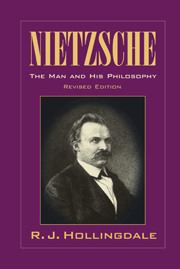1 - The Child
from Part I - 1844-1869
Published online by Cambridge University Press: 13 September 2019
Summary
The Protestant pastor is the grandfather of German philosophy. (A 10)
Nietzsche's views have always seemed so strikingly different from the background of opinion against which he grew up that they have often been thought to owe their origin to a violent reaction against his upbringing. His entire philosophy even has been seen as no more than a calculated antithesis to the tradition in which he was raised. He was the heir of a line of Lutheran pastors going back to the beginning of the seventeenth century, his father and both grandfathers were Lutheran ministers, and he lived the first five and a half years of his life in a parsonage and later in an equally pious home; and it has been argued that his subsequent irreligion is to be explained by reference to these facts. There are two main reasons for rejecting this view as an adequate explanation of the genesis of Nietzsche's thought. In the first place, no serious student today would be inclined to exaggerate the differences between his outlook and that of Christianity: the tendency today—a justified tendency, as I think—is to emphasize the conventional elements in his philosophy and its connection with that ‘Protestant’ tradition of inquiry of which the whole of German philosophy may be said to be a part. Secondly, the need to account for the irrationality supposed to characterize Nietzsche's thought is disappearing with the growing recognition that it is not irrational at all. The notion that his philosophy was a reaction to his environment presupposed it was founded on emotion rather than on reason: the background of emotional rebellion was called on to account for the irrationalism, the irrationalism held responsible for the violence and radical nature of the rebellion. Here again the conventional picture has had to be modified, and the temptation now is to ignore rather than emphasize the element of rebellion which is undoubtedly present in his work and to emphasize rather than ignore its strong links with the past.
The more closely one studies Nietzsche's work, the less inclined one is to look outside it for an elucidation of its meaning or an explanation of its origin.
- Type
- Chapter
- Information
- NietzscheThe Man and His Philosophy Revised Edition, pp. 3 - 17Publisher: Cambridge University PressPrint publication year: 1999



